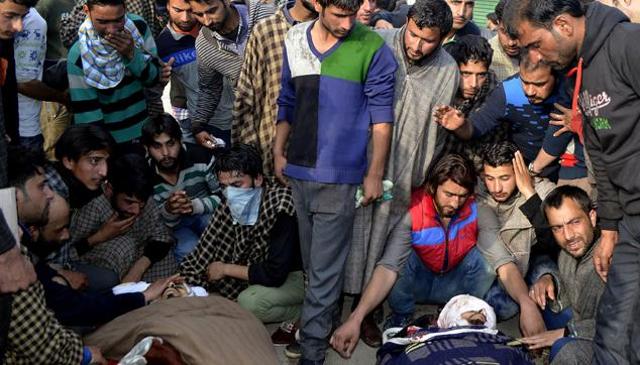Taj Hashmi
The latest killings of scores of freethinking writers by “Islamist” or “unknown” assailants are fast turning Bangladesh into a killing field. The latest killings of an atheist blogger, one university professor, and two LGBT activists in Bangladesh have stirred the world outside Bangladesh. Even the UN has demanded prompt probe into the latest killings in the country. However, what we hear from Bangladesh is bizarre, and unfortunate. While the Home Minister thinks people live in absolute safety, the police chief has asked people to make their own “security circles”. Some politicians have already “identified” the killers, said to be BNP-Jamaat activists! Surprisingly, while the Home Minister asserts there is no ISIS in Bangladesh, the Information Minister has confirmed – with absolute precision – there are 8,000 al Qaeda activists in the country.
Since human insecurity in a modern state is a political problem, only honest politicians can resolve it. I use Ghazzali’s famous book on the incoherence of philosophers metaphorically, to explain the incoherence of politicians in Bangladesh. In his classic The Incoherence of the Philosophers (Tahafut al-Falasifa), famous Muslim philosopher Abu Hamid al-Ghazali (1058-1111) – aka Imam Ghazzali – convincingly argues that philosophers had been consistently inconsistent, incoherently applying logic only to science and mathematics, not to metaphysical, and abstract thoughts and ideas. As politics is all about philosophy – even terrorism is philosophy-driven – so it’s time to look at the age-old incoherence in the realm of Bangladesh politics.
Imputing philosophers’ incoherence to his temporary loss of imaan or faith in Allah and Islam, considering philosophy dangerous, Ghazzali abandoned it altogether. Whether most Bangladeshis have abandoned politics altogether, considering it too dangerous to be associated with, is an important question. A depoliticized nation is like a terminally ill patient, who can’t breathe in any oxygen despite being connected to a cylinder full of oxygen. I think the prevalent “apathy” to politics in Bangladesh is fear-induced, what political thinker Anthony Downs calls “rational ignorance” of the underdogs. The average Bangladeshis are just too scared to open their mouth.
The way pro-BNP or anti-Awami League politicians, journalists, and civil society members are getting arrested and kept behind bars – without trial for indefinite periods – has terrorized would be dissidents. People get arrested, harassed and persecuted by pro-Government police and party activists even for writing critical things in social media, about the Prime Minister, her son, and her government, which came to power through farcical parliamentary elections in January 2014.
Interestingly, there are hardly any major ideological differences, between the various secular, nationalist, and Islamic parties in the country. The differences between the ruling Awami League (AL) and BNP, the main opposition party, are personal than ideological. While the AL promotes “Bangali Nationalism”, the BNP holds fast to “Bangladeshi Nationalism”; their differences are as phony as those between Tweedledum and Tweedledee. Again, both of them are: a) least democratic, and b) not transparent at all.
Ever since the Liberation, different sets of politicians have been telling the people what is more important to them than food, clothing, shelter, healthcare, and education. Politicians have their own versions of cry wolves to deceive the people. Sometimes they tell the people their freedom is at stake; and sometimes people hear about the conspiracies against Islam, hatched out by certain politicians. It’s unbelievable but true, as it appears in the Gulliver’s Travels, Lilliputians were at war against each other over the issue of which end of the egg they should break before making an omelette, many Bangladeshis are programmed to fight each other over the contentious issue if “Bangladeshi” or “Bangali” should be their national identity. Who are “pro-Liberation” and who are “opposed” to freedom is another bone of contention.
Bangladesh since the 1980s has virtually become Satyajit Roy’s Hirak Rajar Desh. And in this hedonistic kingdom of power and pleasure, politicians in power make and break rules, plunder, extort, and even kill with total impunity. Nothing seems immoral, impossible, disorderly, or surprising at all! The “winners take all” is the rule of the game. The opposition – the real ones, not some pseudo-opposition parties – isn’t even entitled to crumbs from the high table. However, there is a problem. All losers aren’t just sitting idle.
There’s, however, an almost invisible albeit not that powerful undercurrent of resistance to the superordinates, who have failed miserably to establish their hegemony among the bulk of the populace. The Bashkhali protest against coal-generated power plant, and mass rallies for the arrest of the killer of Tonu, are just sporadic examples in this regard. The ruling elites’ self-inflicted inability-cum-unwillingness to accept the reality – the existence of any resistance to their rule – has been the biggest incoherence in Bangladesh politics since day one of the emergence of this nation-state.
Ruling elites reject mass protests against massive corruption, injustice, and killing of innocent people as law and order problem, or as machinations by the ubiquitous opposition, “linked with” foreign agents or terrorism. In the past, we heard weird things from the government about the ten truckloads of arms captured by police in Chittagong; the grenade attacks on Sheikh Hasina’s rally; and the rise of Bangla Bhai and the JMB- and HUJI-led terror attacks across the country.
Politicians in power haven’t yet convincing explained scores of violent attacks on innocent people by political goons, law-enforcers or “unknown assailants”; extra-judicial killings by law-enforcers; the killing of 57 army officers at the BDR Headquarters; and the killing of pedestrians, bus and car drivers/passengers in 2013-2014. Last but not least, politicians in power and in the opposition have diametrically opposite stories about the ongoing selective killings of writers, bloggers, and LGBT activists quite for some time. Meanwhile, Bangladesh is fast becoming a safe haven for killing squads and terrorists, and a killing field for innocent victims.
History is replete with examples of rulers’ selling grand but useless objects to the people as symbols of their greatness, grandeur and virtue: the Colossus of Rhodes in ancient Greece; the Taj Mahal in Mughal India; and the Victoria Memorial in British India. The number of flyovers in over-congested Dhaka city for example, which don’t benefit more than five per cent of the population, may be mentioned in this regard. The flyovers are like what was once the “legendary” Kamalapur Railway Station in Dhaka during Ayub Khan’s “Decade of Development” – sold as the best of its kind in Asia.
The long and short of the story is that, instead of leading their followers politically, towards good governance, progress, and nation-building, politicians here mostly mislead people through lies, deceptions, and non-issues. Politicians here behave in the most unethical and unprofessional manner. During the last ten years alone, politicians defended, justified and collaborated with General Moeen Ahmed’s illegitimate regime. They play dubious roles by enacting controversial laws, and holding controversial elections – either boycotted en masse or rigged in the most unprecedented manner.
While innocent people, intellectuals and dissidents get arrested, harassed by law-enforcers, disappear and die, politicians are in a state of denial, and even worse, busy vilifying each other as killers and anti-state elements. Meanwhile, Bangladesh is virtually fast turning into a killing field, and a safe haven for politically well-connected bank defaulters, money launderers, and share-market scammers. Money launderers have so far sent more than 30 thousand crore (thirty billion) taka out of Bangladesh; share-scammers defrauded millions to the tune of several billion takas; and “unknown” criminals robbed more than $100 million from the Bangladesh Bank. Interestingly, the Finance Minister often rubbishes all criticisms of financial scams, and considers these crimes as growing pains of growth and development.
It’s time Bangladeshi politicians resolve their differences, hold credible elections, learn how to respect each other (without turning Donald Trump into their role model), and learn the art and science of governance. Let politics be a means to serve the people, not an end in itself. Bangladeshi politicians must realise, world leaders, various UN agencies, intellectuals, human rights activists, social media and global media as a whole don’t lie, and they have no agendas to harm Bangladesh. The Government should pay heed to what the Guardian has published on the rise of extremism in Bangladesh (26 April, 2016): “Bangladesh's pluralism is at risk if Sheikh Hasina does not stop extremists”.
As a recent Financial Times article “Bangladesh pays for bad politics in blood” (27 April 2016) suggests in the wake of the killings of two LGBT activists in Dhaka, there is no room for complacency for this regime. The article has also cited the latest Report on Bangladesh by the International Crisis Group, which believes that the Government’s “heavy-handed measures are damaging its own legitimacy and benefitting extremists”; and that: “There is no time to lose. If mainstream dissent remains closed, more and more government opponents may come to view violence and violent groups as their only recourse.” Sooner the Hasina Government realise there is no room for complacency, tribalism and rural factional politics or patron-client relationship in democracy, the better. Perpetual cry wolves, denial of the prevalent state of terror, anarchy, and corruption, and blaming the main opposition parties (the BNP and Jamaat-e-Islami) for corruption and terrorism – as this Government has been doing quite for sometime – will eventually backfire.


